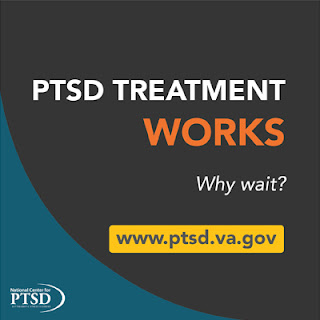Much like addiction, post-traumatic stress disorder (PTSD) can happen to anyone. Those who develop the condition experience debilitating symptoms that can lead to several harmful behaviors. The use of drugs and alcohol to cope with one’s feelings or inability to function and acts of self-harm are exceedingly common among trauma survivors.
June is PTSD Awareness Month; this is an opportunity to raise awareness and encourage men and women to get and give support. Even though post-traumatic stress disorder is treatable, and recovery is attainable, most affected individuals do not receive help. During this vital observance, we would like to do our part to change that reality.
More than 50 percent of men and women will experience at least one traumatic event in their lifetime. The National Center for PTSD reports that about 6 of every ten men and 5 of every ten women experience a trauma. About 7 or 8 out of every 100 Americans will have PTSD at some point in their lives; and, some 8 million adults have the condition during a given year.
While combat is most closely associated with trauma and PTSD, this mental health disorder can arise from numerous types of events. Women who are the victims of child abuse or sexual assault have a high risk of dealing with post-traumatic stress. Whereas, the kinds of traumatic events that men are most commonly exposed to include accidents, physical attack, combat, disaster, or to witness death or injury.
Understanding PTSD
There are several symptoms that can affect men and women who contend with post-traumatic stress. Experts break up the condition’s markers into four (4) categories. In order to receive a diagnosis, the National Institute of Mental Health states that an adult must have all of the following for at least one month:
- Re-experiencing type symptoms: (at least one) recurring, involuntary and intrusive distressing memories, flashbacks, nightmares, and intrusive thoughts.
- Avoidance: (at least one) steering clear of certain places or objects that are reminders of the traumatic event.
- Arousal and Reactivity: (at least two) being easily startled, feeling tense, or outbursts of anger.
- Cognition and mood symptoms: (at least two) having trouble recalling the event, negative thoughts about one’s self; and, feeling numb, guilty, worried or depressed.
Post-traumatic stress disorder can make functioning at work, at home, and socially a significant challenge. Mental health conditions require treatment, such as psychotherapy, self-management strategies, and medications. Without it, men and women lack the tools for coping with anxiety and flashbacks in a healthy manner.
More than 1 in 4 veterans with PTSD also have substance use disorders, according to the Veterans Health Administration. Moreover, civilians with PTSD were 2 to 4 times more likely to meet criteria for a substance use disorder, according to Clinical Psychology: Science and Practice. More than half of the individuals living with the disease have co-occurring addiction.
Substance Use and Co-Occurring PTSD Treatment
At Hope By The Sea, our highly trained staff can assist you or loved one in breaking the cycle of addiction and addressing post-traumatic stress disorder. Please contact us today to learn more about our California Dual-Diagnosis Treatment for men and women. The miracle of recovery can be yours too…


